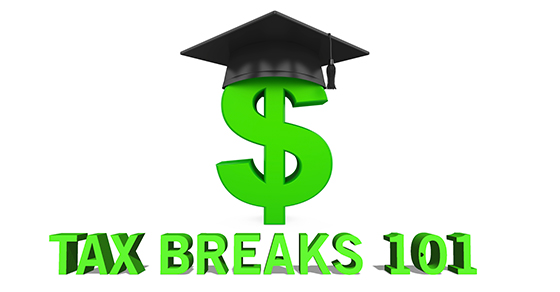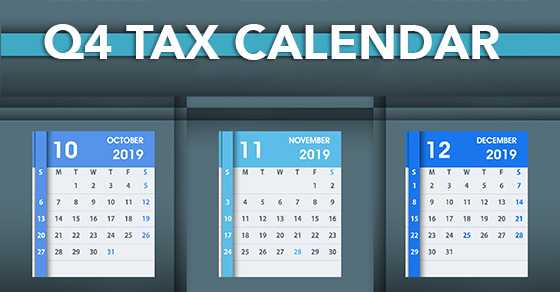Weekly Tax Brief
Setting up a Health Savings Account for your small business
- Details
- Published: 01 November 2019 01 November 2019

Given the escalating cost of employee health care benefits, your business may be interested in providing some of these benefits through an employer - sponsored Health Savings Account (HSA). An HSA provides a number of tax benefits for your business and its employees. Contact us if you have questions or you're interested in setting one up.
Read more: Setting up a Health Savings Account for your small business
Selling securities by year end? Avoid the wash sale rule
- Details
- Published: 29 October 2019 29 October 2019

If you’re planning to sell assets at a loss to offset gains that have been realized during the year, it’s important to be aware of the “wash sale” rule. Under this rule, if you sell stock or securities for a loss and buy substantially identical stock or securities back within the 30-day period before or after the sale date, the loss can’t be claimed for tax purposes. The rule is designed to prevent taxpayers from using the tax benefit of a loss without parting with ownership in a significant way. Note that the rule applies to a 30-day period before or after the sale date to prevent “buying the stock back” before it’s even sold. Contact us if you have any questions.
Read more: Selling securities by year end? Avoid the wash sale rule
Use a Coverdell ESA to help pay college, elementary and secondary school costs
- Details
- Published: 21 October 2019 21 October 2019

You may be able to save for your child’s or grandchild’s education with a Coverdell Education Savings Account (ESA). There’s no upfront federal tax deduction for contributions, but the earnings grow tax-free. No tax is due when the account funds are withdrawn, to the extent the amounts don’t exceed the child’s qualified education expenses. Qualified expenses include college tuition, fees, books and room, as well as elementary and secondary school expenses. The annual contribution limit is $2,000 a year from all contributors for all ESAs for the same child. The amount you can contribute is phased out if your modified adjusted gross income exceeds $95,000 ($190,000 for married joint filers).
Read more: Use a Coverdell ESA to help pay college, elementary and secondary school costs
Understanding and controlling the unemployment tax costs of your business
- Details
- Published: 18 October 2019 18 October 2019

Employers must pay federal unemployment tax on amounts up to $7,000 paid to each employee as wages during the year. Typically, the more claims made against a business, the higher the unemployment tax bill. But there may be ways to control costs. Don’t hire employees to fill short-term jobs. To avoid layoffs, use temps.
If you must hire, do so carefully to increase the chance that employees will work out. And if you terminate someone, provide severance and outplacement services, which may delay the start of unemployment benefits and cause them to end sooner. Contact us for more ideas.
Read more: Understanding and controlling the unemployment tax costs of your business
Take advantage of the gift tax exclusion rules
- Details
- Published: 14 October 2019 14 October 2019

As we head toward gift-giving season, you may be considering giving cash or securities to your loved ones. Taxpayers can transfer amounts free of gift taxes to their children or others each year through the use of the annual federal gift tax exclusion. Contact us with questions.
Watch out for tax-related scams
- Details
- Published: 11 October 2019 11 October 2019

Victims of tax-related scams can be contacted through regular mail, phone calls and email. If you receive a text, letter, email or phone call purporting to be from the IRS, keep in mind that the tax agency never calls taxpayers demanding immediate payment using a specific method of payment (such as a wire transfer or prepaid debit card). The IRS generally mails bills or notices to taxpayers and gives them time to respond with questions or appeals. The tax agency also doesn’t threaten taxpayers with arrest. In addition, the IRS doesn’t initiate contact by email, text message or social media channels to request information. Contact us if you have questions about a letter, email or call from the IRS.
Uncle Sam may provide relief from college costs on your tax return
- Details
- Published: 07 October 2019 07 October 2019

We all know college is expensive. Fortunately, there are two sizable federal tax credits for higher education costs that you may be able to claim. The American Opportunity credit generally provides the biggest benefit to most taxpayers. It offers a maximum benefit of $2,500. But it phases out based on modified adjusted gross income (MAGI). For 2019, the MAGI phaseout ranges are between $80,000 and $90,000 for single taxpayers, and between $160,000 and $180,000 for married joint filers. There’s also the Lifetime Learning credit, which equals 20% of qualified education expenses for up to $2,000 per tax return. There are requirements to qualify for both credits. Contact us for more information.
Read more: Uncle Sam may provide relief from college costs on your tax return
2019 Q4 tax calendar: Key deadlines for businesses and other employers
- Details
- Published: 04 October 2019 04 October 2019

Here are a few key tax-related deadlines for businesses and other employers during Quarter 4 of 2019. Contact us for more about the filing requirements and to ensure you’re meeting all applicable deadlines.
Read more: 2019 Q4 tax calendar: Key deadlines for businesses and other employers
How to treat your business website costs for tax purposes
- Details
- Published: 30 September 2019 30 September 2019

Most businesses have a website. But determining the proper tax treatment for the costs involved in developing a website isn’t easy. The IRS hasn’t yet released official guidance, so you must apply existing guidance that’s available on other costs to the issue of website development costs. The exact treatment of website design costs depends on whether they’re software or hardware and whether they’re part of a start-up business. If you hire third parties to set up and run your website, payments are currently deductible as ordinary and necessary business expenses. Contact us if you have questions or want more information about planning for website costs.
Read more: How to treat your business website costs for tax purposes
Getting a divorce? There are tax issues you need to understand
- Details
- Published: 23 September 2019 23 September 2019

In addition to the difficult personal issues that divorce entails, several tax concerns need to be addressed to ensure that taxes are kept to a minimum and that important tax-related decisions are properly made. For example, if you sell your personal residence or one spouse remains living there while the other moves out, you’ll want to make sure you’ll be able to avoid tax on up to $500,000 of gain. You also must decide how to file your tax return for this year (single, married filing jointly, married filing separately or head of household). There are several other issues you may have to deal with. We can help you work through all of the financial issues involved in divorce.
Read more: Getting a divorce? There are tax issues you need to understand





